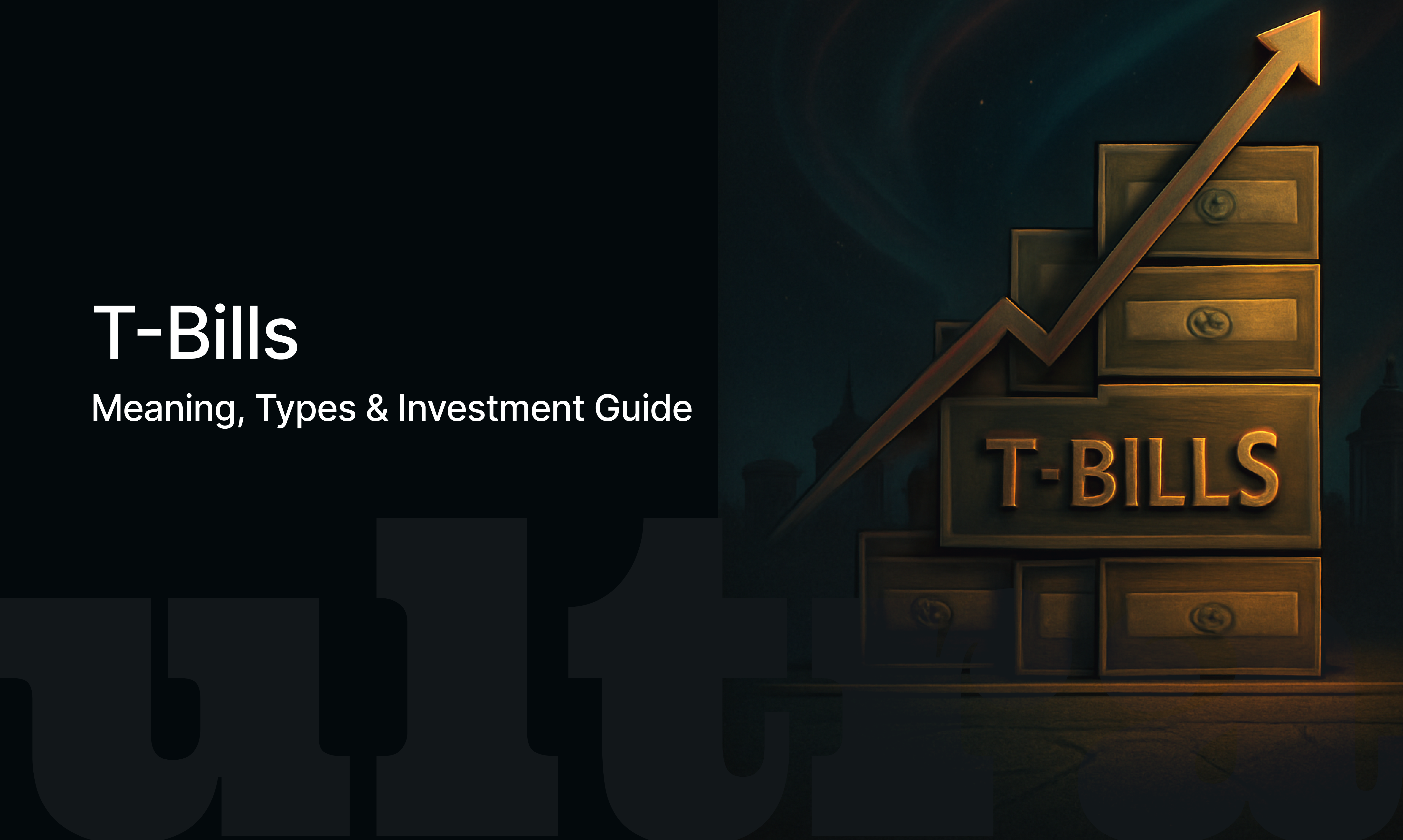Treasury Bills in India: Meaning, Types & Investment Guide
28 July 2025 · Sachin Gadekar
Everything you need to know about treasury bills – from what they are, how they work, to how you can invest in them in India.

What are Treasury Bills?
In the world of safe investments, treasury bills (T-bills) stand out as a preferred choice for risk-averse investors. Issued by the Government of India, treasury bills are short-term debt instruments that help the government manage its short-term liquidity requirements. In return, investors get a virtually risk-free instrument with assured returns.
In this article, we at Ultra break down the meaning of treasury bills, how they work, their types, features, and how you can invest in them. Whether you’re preparing for UPSC, looking to diversify your portfolio, or simply wish to understand more about government securities, this guide covers it all.
Treasury Bills, often abbreviated as T-bills, are short-term government securities issued by the Reserve Bank of India (RBI) on behalf of the Government of India. These instruments are issued at a discounted price and redeemed at face value on maturity.
Treasury Bills Meaning
Treasury bills are zero-coupon securities, which means they do not offer any interest or coupon during the tenure. The return to the investor is the difference between the issue price and the face value received on maturity.
For example, a 91-day treasury bill may be issued at ₹97.5, and upon maturity, the investor will receive ₹100.
Key Features of Treasury Bills in India
Issuer: Government of India via the RBI
Tenure: 91 days, 182 days, and 364 days
Denomination: Multiples of ₹25,000 for individuals and institutions
Risk: Virtually risk-free (sovereign guarantee)
Liquidity: Highly liquid; traded in the secondary market
Returns: Lower than other instruments but guaranteed
Types of Treasury Bills
In India, treasury bills are issued in three main maturities:
91-Day T-bills: Shortest maturity, issued weekly.
182-Day T-bills: Medium-term bills, issued bi-weekly.
364-Day T-bills: Longest duration among T-bills, issued bi-weekly.
The 91-day treasury bill is the most commonly traded and preferred by banks and institutional investors for managing short-term liquidity.
How Do Treasury Bills Work?
Treasury bills are issued via auctions conducted by the RBI. Investors bid for these securities at a price lower than their face value. Upon maturity, the full face value is paid to the investor.
Let’s say the face value is ₹100:
You buy it at ₹96
On maturity, you receive ₹100
Your return is ₹4 per T-bill
The return is effectively the discount rate, and it is influenced by market demand, interest rate environment, and RBI policy decisions.
Who Can Invest in Treasury Bills?
Treasury bills are open for:
Retail investors (via NSE goBID or RBI Retail Direct)
Banks
Corporates
Mutual funds
Insurance companies
Foreign portfolio investors (FPIs)
This wide accessibility, especially through platforms like RBI Retail Direct, has made treasury bills popular even among individual investors in recent times.
How to Invest in Treasury Bills in India?
You can invest in treasury bills through the following channels:
1. RBI Retail Direct Portal
A dedicated platform launched by RBI where retail investors can directly invest in government securities, including T-bills. Requires PAN, Aadhaar, and a linked bank account.
2. Stock Exchanges (NSE/BSE goBID)
The NSE goBID and BSE Direct platforms allow individuals to invest via demat accounts and brokers.
3. Primary Dealers and Banks
You can also invest through SEBI-registered primary dealers or designated banks that participate in RBI auctions.
Benefits & Drawbacks Of T-Bills
Benefits of Investing in Treasury Bills:
Risk-Free Returns: Backed by the sovereign, the safest form of investment.
Short Tenure: Ideal for short-term parking of surplus funds.
No TDS: Interest income is taxable, but no tax is deducted at source.
High Liquidity: Easily tradable in the secondary market.
Better than Savings Account: Offers higher returns compared to traditional savings accounts or fixed deposits for short duration.
Drawbacks to Consider:
Lower Returns: Compared to corporate bonds or stocks.
Taxable Gains: While no TDS is deducted, returns are taxable as per your income slab.
Requires Demat or Online Access: For participation in RBI auctions or secondary market.
Treasury Bills vs Bonds
| Feature | Treasury Bills | Government Bonds |
|---|---|---|
| Tenure | Less than 1 year | More than 1 year |
| Returns | Discounted, no interest | Fixed interest (coupon) |
| Issued At | Discounted price | Face value with coupon |
| Target Investors | All investor types | Typically long-term investors |
Why Treasury Bills Are Important
Monetary Policy Tool: RBI uses T-bills to control liquidity in the market.
Cash Management: Offers the government a way to manage short-term cash deficits.
Safe Haven Asset: Preferred by investors during uncertain economic conditions.
FAQs on Treasury Bills
1. What are treasury bills in India?
Treasury bills are short-term debt instruments issued by the Government of India to raise money for up to one year. They are issued at a discount and redeemed at face value.
2. How are returns from treasury bills calculated?
Returns are the difference between the discounted purchase price and the face value received on maturity.
3. Are treasury bills risk-free?
Yes, they are backed by the sovereign and considered risk-free in terms of default.
4. Can individuals invest in treasury bills?
Yes, retail investors can invest via RBI Retail Direct or NSE/BSE goBID platforms.
5. Are treasury bills better than fixed deposits?
For short-term investment and risk-free returns, treasury bills may offer better post-tax returns than bank FDs.
Final Thoughts
Treasury bills in India are an excellent option for investors looking for safe, short-term investment avenues. With their high liquidity, minimal risk, and assured returns, they serve both retail and institutional investors well.
At Ultra, we believe in empowering investors with knowledge and diverse investment opportunities. While T-bills might not deliver high returns, their safety and reliability make them a foundational part of any low-risk portfolio.
Want to explore more secure investment options? Visit Ultra today and diversify your portfolio with government securities and beyond.